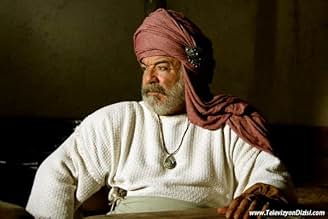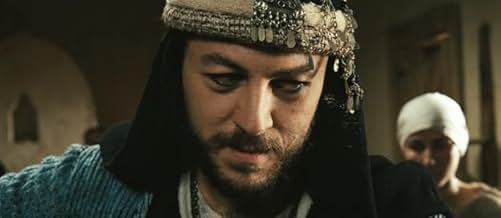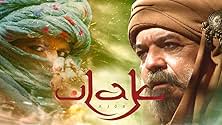Ajouter une intrigue dans votre langueIn a place where there is no time, a traveler comes to an unnamed village where we do not know where on the map. The weary traveler is a messenger. They have stories to tell, words to say.In a place where there is no time, a traveler comes to an unnamed village where we do not know where on the map. The weary traveler is a messenger. They have stories to tell, words to say.In a place where there is no time, a traveler comes to an unnamed village where we do not know where on the map. The weary traveler is a messenger. They have stories to tell, words to say.
- Récompenses
- 2 victoires et 9 nominations au total
Zuhal Gencer
- Cemile
- (as Zuhal Gencer Erkaya)
Yagiz Atakan Savas
- Ferhat
- (as Atakan Yagiz)
Avis à la une
This film definitely has its own way of telling a story. While watching, it gives you the feeling of listening to a fairy tale, which I haven't felt for many years. I must admit that the film has religious implications, because of the story in the background, but they are not necessarily negative criticisms. By choosing children as the main audience in the "messiah story", this film separates itself from any other religious-story-telling films or books. The costumes, acting and conversations all have that fairy tale style as a whole. I see "hope" as the main theme of this film as "even an unrealistic hope can change people's lives". Please don't watch and judge this movie with your or others belief-defending opinions. It just shows the power of imagination. Also it is a good and a different step for Turkish cinema.
Set in an unspecified medieval period, ULAK centers on Zekeriya, a doctor (Çetin Tekindor) who visits a village and begins to tell mysterious stories of the past, present and future to a group of children and adults. The stories focus on the power of God, the importance of remaining true to oneself and the need to overcome tyranny. The center of his tales is a crippled character Murad (Ömer Hüsnü Turat) who possesses some kind of spiritual power despite his disability.
Zekeriya's presence within the community immediately causes suspicion: what kind of power does he have over the children? For the village elders, accustomed to wielding their patriarchal power over their women and their offspring, he represents a subversive force, and therefore needs to be removed. The only snag is that he possesses the kind of resilience that is infectious - so infectious, in fact, that he encourages the children to resist their parents. Young Ferhat (Atakan Yağız) offers a case in point - despite his father's attempts to beat him into submission, he remains unbowed, and eventually departs with Zekeriya to a better world.
Part-fantasy, past religious epic, Çağan Irmak's film underlines the importance of being true to oneself, even if life's circumstances turn against you. This is way Zekeriya preaches, using his autobiographical experiences with Murad as an example. Tyrannies will never survive in a world whose inhabitants understand the existence of a higher power in whom they can trust. Such views are not only religiously important, they have an intimate bearing on contemporary politics. The film's ending is particularly satisfying, as the children and the believers go forth into a promised land, leaving the former tyrants and their families to die. ULAK is particularly harsh on those who simply follow popular sentiment without understanding anything about themselves or the societies they inhabit. They are at once the least intelligent yet most dangerous of people.
To be honest, some of the action is a little sentimental, adumbrating some of Irmak's later work such as THE SLEEPING PRINCESS (PRENSES'IN UYKUSU), especially towards the end of the the film when Zekeriye reveals the ending to his tale to the accompaniment of swirling violins on the soundtrack. There is also the question of the film's epigraph, dedicated to all children with the capacity to dream; on this view, Irmak suggests that all adults have somehow been corrupted and it is incumbent on the younger generation to create a better world. This might be true, but it suggests a view of childhood with its roots in European Romanticism rather than spirituality.
Zekeriya's presence within the community immediately causes suspicion: what kind of power does he have over the children? For the village elders, accustomed to wielding their patriarchal power over their women and their offspring, he represents a subversive force, and therefore needs to be removed. The only snag is that he possesses the kind of resilience that is infectious - so infectious, in fact, that he encourages the children to resist their parents. Young Ferhat (Atakan Yağız) offers a case in point - despite his father's attempts to beat him into submission, he remains unbowed, and eventually departs with Zekeriya to a better world.
Part-fantasy, past religious epic, Çağan Irmak's film underlines the importance of being true to oneself, even if life's circumstances turn against you. This is way Zekeriya preaches, using his autobiographical experiences with Murad as an example. Tyrannies will never survive in a world whose inhabitants understand the existence of a higher power in whom they can trust. Such views are not only religiously important, they have an intimate bearing on contemporary politics. The film's ending is particularly satisfying, as the children and the believers go forth into a promised land, leaving the former tyrants and their families to die. ULAK is particularly harsh on those who simply follow popular sentiment without understanding anything about themselves or the societies they inhabit. They are at once the least intelligent yet most dangerous of people.
To be honest, some of the action is a little sentimental, adumbrating some of Irmak's later work such as THE SLEEPING PRINCESS (PRENSES'IN UYKUSU), especially towards the end of the the film when Zekeriye reveals the ending to his tale to the accompaniment of swirling violins on the soundtrack. There is also the question of the film's epigraph, dedicated to all children with the capacity to dream; on this view, Irmak suggests that all adults have somehow been corrupted and it is incumbent on the younger generation to create a better world. This might be true, but it suggests a view of childhood with its roots in European Romanticism rather than spirituality.
That was what Cagan Irmak said before the movie was seen "if you are expecting clichés, you will not be satisfied". This movie was totally different. The style, the life, the people in the movie was kind of weird. However, everything was great, well prepared. Movie tells a tale about a "messenger" in ancient times. The tale tells people every side of a life, a woman lets men use her daughter for money, a bad man, a crazy woman, a boy and a girl that can not be together... Cetin Tekindor (Zekeriya) played nearly perfect in the movie. In addition, kids played their roles awesome. They were too natural, and they were living the environment. The soundtracks are great, images are impressive. One of the bests, 9/10.
the atmosphere. the architecture. the emotion. the words who becomes pillars. the image of wise story teller. and the magic in a not comfortable manner. a film who could be window to memories. or rediscover of pure story, from classic Oriental recipes. but, step by step, scene by scene, you discover it be more than charming introduction in mythical universe. but a parable who remains the perfect manner to describe the present as just one of forms of past. the expectation. the force of dream. the fear. and the curiosity. the challenge. and the bitter words. and, sure, the large slices of silence. a film who is more a window to a lost world than a fairy tale's exposure. because it reminds the roots of the life. and the importance of its values.
First of all I'm really happy to see that Turkish cinema has reached international standards in terms of technical features of film making. The movie "Ulak" has very decent camera work, lighting, costumes and scene creation. Almost half of the movie is shot in the night and everything is well done. We can see every bit of the scene yet we're convinced that it's dark. This is not we're used to see is Turkish film making.
Now let's come the movie itself. I'd never seen a Cagan IRMAK(the director) movie before. I did not have any expectations actually. I was very much neutral. After watching the movie I questioned myself and thought about it over and over but I could not figure out what all it was about! There is a promising story but it is very vague. One can get different messages from it or not. Neither I can say who the people are in the movie nor what the era it is they live in. It looks like they are one of the Turkish tribes before Ottoman Empire living in southern parts of Anatolia. But no one can say it is for sure. So, place, characters and the time is not so clear to the audience. Therefore we cannot know what to expect or how to interpret the story.
And my last but not least complaint is, and I think this is the biggest problem of Turkish Cinema, the movie looks much more like a theater play than a cinema movie. Let me say why; most of the cast is coming from theater origin yet this is the least important cause of the problem. It doesn't feel like "Cinema" because it's shot in almost three places, a hand build village stage, a barn yard and some very short outside shots. Acting can be considered quite well if they were on the stage of the theater, in front of the audience. But the acting is much more dramatic than it should. One might say it's epic, but I could not see where the saga is.
So, our directors are so keen to shot sagas and tales but before that they ought to learn how to tell a story on the big screen in a solid manner. But of course, they need to have a solid story and scenario beforehand.
Now let's come the movie itself. I'd never seen a Cagan IRMAK(the director) movie before. I did not have any expectations actually. I was very much neutral. After watching the movie I questioned myself and thought about it over and over but I could not figure out what all it was about! There is a promising story but it is very vague. One can get different messages from it or not. Neither I can say who the people are in the movie nor what the era it is they live in. It looks like they are one of the Turkish tribes before Ottoman Empire living in southern parts of Anatolia. But no one can say it is for sure. So, place, characters and the time is not so clear to the audience. Therefore we cannot know what to expect or how to interpret the story.
And my last but not least complaint is, and I think this is the biggest problem of Turkish Cinema, the movie looks much more like a theater play than a cinema movie. Let me say why; most of the cast is coming from theater origin yet this is the least important cause of the problem. It doesn't feel like "Cinema" because it's shot in almost three places, a hand build village stage, a barn yard and some very short outside shots. Acting can be considered quite well if they were on the stage of the theater, in front of the audience. But the acting is much more dramatic than it should. One might say it's epic, but I could not see where the saga is.
So, our directors are so keen to shot sagas and tales but before that they ought to learn how to tell a story on the big screen in a solid manner. But of course, they need to have a solid story and scenario beforehand.
Meilleurs choix
Connectez-vous pour évaluer et suivre la liste de favoris afin de recevoir des recommandations personnalisées
Détails
Box-office
- Montant brut mondial
- 3 248 267 $US
- Durée1 heure 49 minutes
- Couleur
- Rapport de forme
- 2.35 : 1
Contribuer à cette page
Suggérer une modification ou ajouter du contenu manquant






















